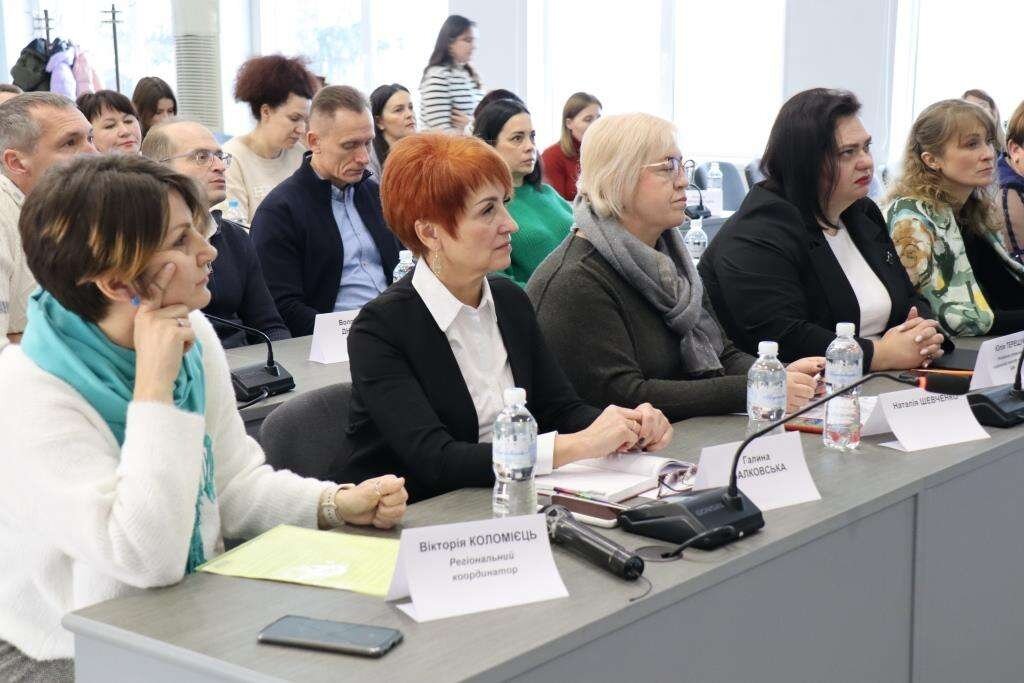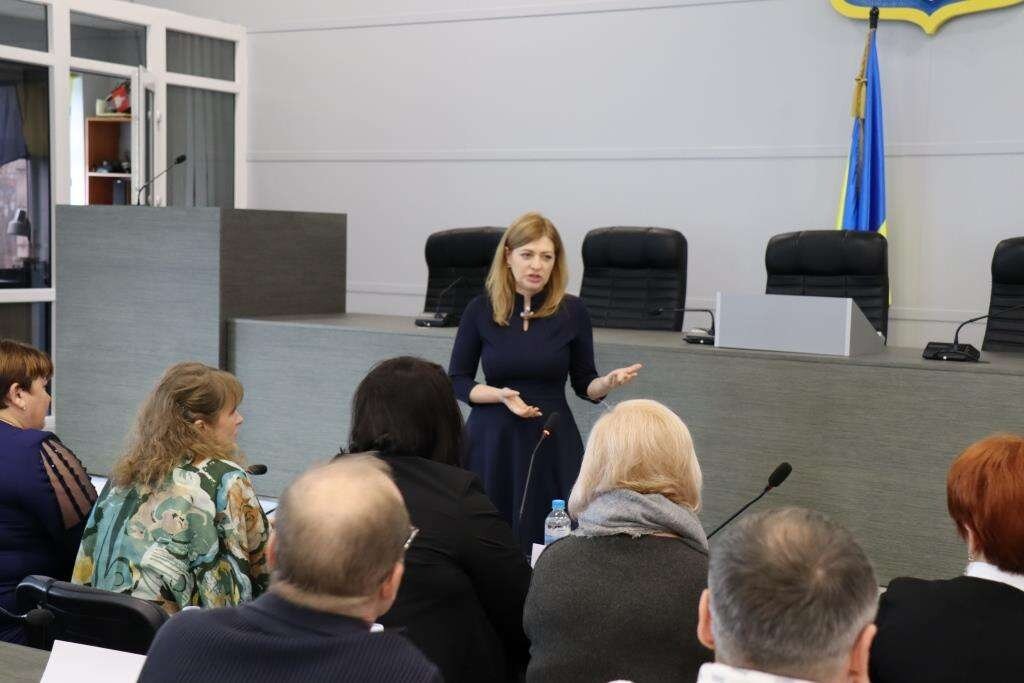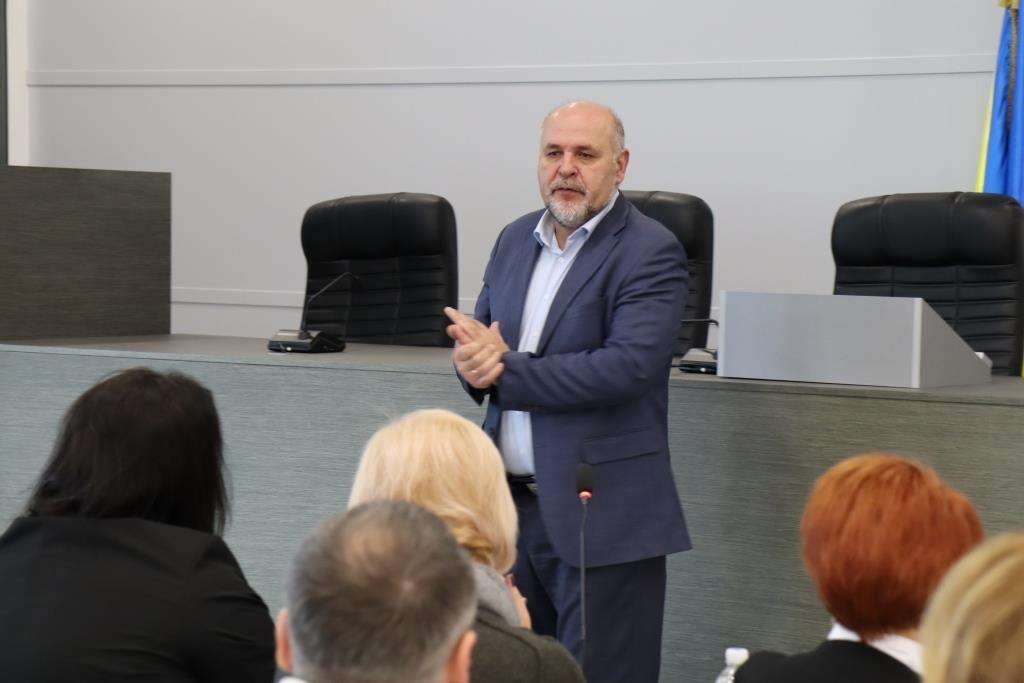On November 24, a "round table" was held in Bila Tserkva on the topic: "Restoration of damaged housing in Kyiv region under the project "Housing for Life: Comprehensive Solutions for Internally Displaced Persons (IDPs)".

Tetyana Boyko, head of the "Housing for Life" project, emphasized that the project involves cooperation with local self-government bodies, with the aim of finding ways and mechanisms to restore housing, developing joint algorithms. In particular, this is the restoration of abandoned buildings in cities, their transfer to community ownership for use by internally displaced persons; arrangement of compact living spaces (dormitories), modular towns as places of temporary residence for displaced persons, search and rent of suitable housing on a commercial basis, etc. The project also includes advocacy of community interests at the national level, assistance in writing projects to attract donor funds, etc.

The main directions of the project are consultations for residents of 15 communities in 9 regions of Ukraine, in which housing is damaged or destroyed, on how to restore housing. Currently, there are 9 different programs and algorithms that provide for the restoration of housing. More than 1,500 such consultations have already been provided, and most of them are not one-time, but permanent, that is, support is provided.
The speaker noted that the project aims not only to restore damaged housing. It covers a number of important issues in order to create adequate living conditions for people who were forced to leave their homes due to the war. In particular, she emphasized that, in addition to authorities, people should also participate in the restoration of their property, take care of their property, using all available mechanisms. One of the ideas of the event is to build a communication triangle: the government, the public and internally displaced persons.
The Mayor of White Tserkva Hennadiy Dykiy addressed the audience with a welcome speech. He emphasized that the full-scale invasion became an extremely serious challenge for our state, and people who were forced to leave their homes lost everything - property, housing and, one might say, their past lives. And today these people have to start all over again. Therefore, the task of the city government from 2014 to today is to support and facilitate the integration of internally displaced persons into the life of our city. For this, it is important to improve the investment climate for the creation of a labor market with a competitive wage level, infrastructure development, provision of temporary housing, proper medical care, functioning of educational institutions, pre-school and out-of-school institutions.

"More than 8 million Ukrainians left abroad after the full-scale invasion. And we must all make efforts - at all levels of government - to, first of all, create proper living conditions for internally displaced persons so that they do not leave Ukraine. Secondly, to make the conditions such that Ukrainians from abroad would want to return home. We all believe in victory, we strive for it, and we are all convinced that it will come, but we need to work now," Hennadiy Dyky emphasized.
The mayor noted that about 17,000 internally displaced persons are registered in Bila Tserkva today. At the beginning of the full-scale offensive, Bila Tserkva received 500-700 people a day, paying maximum attention and providing assistance to every person, especially children. He also expressed his gratitude to all residents and organizations of the city, who made efforts to accommodate IDPs, international organizations that provided assistance, etc.
The deputy village head of the Makariv territorial community, Maryna Radchenko, and the deputy head of the social protection department of the Makariv territorial community, Nataliya Maceeva, focused on the practical aspects of working with IDPs in the direction of social protection of the population in their community. They informed about the condition of the housing stock and how the repair and reconstruction of damaged housing is taking place. It is worth emphasizing that in this community 580 houses and 600 apartments were completely destroyed and about 2000 houses were damaged. In particular, the speakers informed about the work of local authorities in this direction, participation in state programs for both housing reconstruction and support for the affected local population and IDPs who came to the community. The involvement of international donors in this work last year and its continuation were noted. According to the speakers, part of the housing is gradually being restored, and modular towns are being built for the people whose homes were destroyed.
Yuliya Tereshchuk, the head of the social protection department of the Bilotserkiv city council, informed about the experience of the local government's work with IDPs since 2014, in particular, the creation of working groups and the first efforts to develop operational work plans, and then programs that provide support and assistance to IDPs. Yulia Tereshchuk also spoke about the organization of work already at the beginning of the full-scale war: the creation of headquarters for the reception of IDPs, the Center for their registration and further support; the participation of Belarusians in the "Shelter" program, as well as programs that IDPs can use to get help or adapt to life in our community. She also noted the creation of a local council on IDP issues as a step to establish cooperation with local government.
Oleksiy Kudinov, head of the Council on IDPs in Bila Tserkva, spoke about work to support this category of population, cooperation with local authorities, establishing communication, etc. He analyzed the problematic issues and characterized the main areas of activity in helping both adults and children from among IDPs.
Viktoriya Kolomiets, a member of the commission for the implementation of the state program "Restoration in the city of Bila Tserkva", shared the practical aspects of the procedure for obtaining compensation for damaged housing in the Kyiv region. She emphasized that there are 9 procedures, according to which you can participate in the restoration of damaged and destroyed housing. I stopped at the normative and legal framework that operates in the state and regulates the receipt of compensation for damaged or destroyed housing. She shared her experience in overcoming difficulties in the practical plane when using the specified procedures and developing work with proposals for improving their functioning, which were subsequently submitted to the government of our country.
The representative of the grantors, Olha Zayarna, adviser on the involvement of civil society and partnership development of the Program Support of Civil Society Organizations in Ukraine, also took part in the event.
Those present shared successful projects regarding the opening of support centers for women and children, where they would have the opportunity to live, study, career guidance, rehabilitate and develop. The practical experience of exercising the right to restore damaged/destroyed housing was also discussed in detail.
It is worth emphasizing that all the participants noted that the post-war reconstruction of territories temporarily occupied or destroyed as a result of military aggression will take a long time. Therefore, among today's challenges is the task not only to provide IDPs with affordable housing, but also to generally create a viable environment for them, where people who have lost their homes can socialize, find work, and gain access to basic services, such as education, health care , meet other household needs. Therefore, the work in this direction is extremely relevant and important and requires even greater attention and action.
The event was also attended by internally displaced persons, managers and assets of condominiums of Kyiv region, whose houses were destroyed, local self-government bodies of Irpin, Borodyan, Bilotserkiv and Makariv territorial communities.
The project "Housing for Life: Integrated Solutions for Internally Displaced Persons" was created by the Public Organization "Kyiv City Branch of the All-Ukrainian Public Organization "Civic Network OPORA" thanks to a grant received from the Program "Support of Civil Society Organizations (CSOs)" in Ukraine within the financial support of the Embassy of the Great Britain. The program is implemented by Crown Agents in partnership with International Alert and in cooperation with Crown Agents in Ukraine.
The content of the publication does not necessarily reflect the views of the Embassy of Great Britain, the views of Crown Agents, International Alert and Crown Agents in Ukraine.